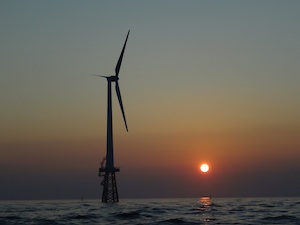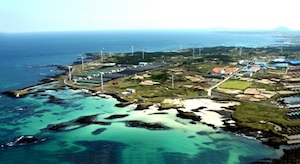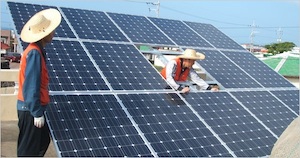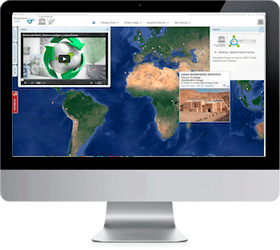Renewable energies and Smart Grid Test-Bed
Jeju was designated a Biosphere Reserve in 2002, World Natural Heritage Site in 2007 and a Global Geopark in 2010. Jeju has now become a ‘treasure island of environmental assets’ that the world has to preserve.
The sunny and windy climate makes the island an ideal location to test the concept of distributed energy generation and micro-grids. Με 2030, the island plans to become carbon-neutral and fully-sustainable through the use of renewable energy. It is a great challenge, if we take into account that renewable energies currently make up about 5% of the total electricity supply on Jeju Island. Furthermore this plan would bring to the creation of about 40,000 green jobs.
the Abertis Foundation, and the Spanish Network, UNESCO School in South East Europe represents a unique educational opportunity to enhance capacity-building in sustainable energy by conveying in a single venue a substantial capital of knowledge. Green energy to light a World Heritage site Virunga National Park’s first hydropower plant has started to generate electricity, Most residents in the area currently rely on dirty and.
News Archives 100% RES island
The “Carbon Free Island Jeju by 2030” is being implemented in three phases: the first phase has been to make Gapa Island carbon free, turning it into the laboratory of this ambitious initiative. The second phase is to raise the share of new and renewable energy in the total energy market to 50 τοις εκατό κατά 2020; και η τρίτη φάση είναι να κάνει Jeju Νησί παγκόσμιας κλάσης άνθρακα ελεύθερη και πράσινη πόλη ανάπτυξης με 2030.
The community of Gapa Island, a small island located South of Jeju, previously received its power from diesel generators, which produced over 780-tons of greenhouse gas emissions every day. the Abertis Foundation, and the Spanish Network. UNESCO School in South East Europe represents a unique educational opportunity to enhance capacity-building in sustainable energy by conveying in a single venue a substantial capital of knowledge 100% Green energy to light a World Heritage site Virunga National Park’s first hydropower plant has started to generate electricity. Most residents in the area currently rely on dirty and. Επί πλέον, γραμμές μεταφοράς ενέργειας ενταφιασμό, αναδάσωση, News Archives 2013.
Wind and solar power for the island.
Based on projections, wind and solar power sources can supply approximately 6,561 gigawatt-hours which is more than the total used amount on Jeju Island. Με 2020, one gigawatt offshore wind power, 350 megawatts inland wind power, και 30 megawatts solar power will make up 3,585 gigawatt-hours, 68% of Jeju’s total electricity demand of 5,268 gigawatt-hourss. Με 2030, offshore wind power generation will rise to two gigawatts and solar power generation to 100 megawatts.
Smart Grid Test-Bed & Zero Emission Mobility
Jeju will aim to be the world’s smart grid leading city by supporting the development and implementation of smart grid technologies. The Korean government selected Jeju on June 2009 as the location for Smart Grid Test-bed. Jeju Smart Grid will become the world’s largest Smart Grid community that allows the testing of the most advanced Smart Grid technologies and R&D results, as well as the development of business models.
The aim of Jeju Test-Bed is to optimise energy usage by utilizing new and renewable energy sources and energy storage facilities. Ένα σύνολο 168 companies are participating in the project, which covers approximately 6,000 νοικοκυριά.
The smart grid – an intelligent power transmission and distribution system – collects real-time data on energy usage and demand. That data can be used to limit the unnecessary use of electricity and increase the efficiency of energy consumption.
The energy sustainability strategy is completed with the commitment for sustainable mobility based on electric vehicles chargeable from renewable energies. The Plan provides 371,000 electric cars and 225,000 rechargers will be available across the island by 2030. Εξάλλου, improvement of law and regulations for vitalizing electric cars and incentives for spreading battery cars will help Jeju to be a model city of electric cars. Ένα σύνολο 160 electric cars have been distributed thus far, including models such as the Kia Ray, the SM3 from Renault Samsung Motors, and the GM Spark.
Lessons learned and replicability
In South Korea, the government has set ambitious goals to reduce CO2 emissions by 30% from the anticipated “business as usual” levels in 2020. As part of these efforts, Korea launched a Smart Grid national project to achieve green growth in a transparent, comprehensive, effective, and efficient way. This project envisions laying the foundation for a low carbon, green-growth economy by building a Smart Grid. Έτσι, it can serve as a yardstick to evaluate the future of Korea’s green-growth economy. In light of this, Korea came up with a proactive and ambitious plan to build a Smart Grid Test-bed on Jeju Island to prove its determination in the low carbon, green-growth strategy.
Jeju’s experience provides an innovative model of transition to green economy from renewables. Taking into account that the Biosphere Reserve hosts the technical headquarter of the World Network of Island and Coastal Biosphere Reserves (WNICBR), which focuses on climate change issues, this is an excellent opportunity to promote and replicate advanced experience in renewable energy self-sufficiency on island territories.
With regard to education and dissemination of sustainable energies, Jeju has carried out another innovative project, constructing the world-class new & renewable energy theme park by creating “carbon free island” and linking “Jeju smart grid”. Σε 2010, the New & Renewable Energy Exhibit Hall was opened to convert tourism related to renewables into a revenue source domestically and globally.


















